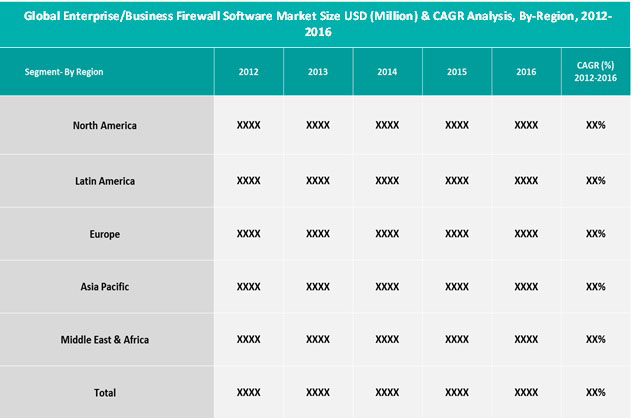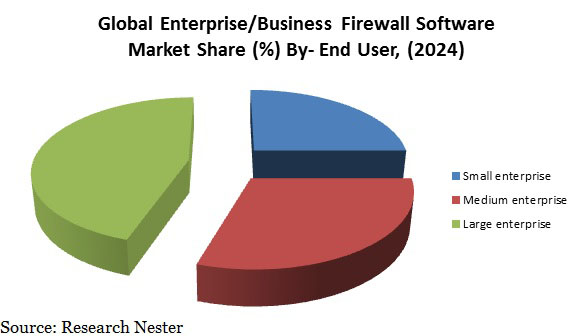Global Enterprise/Business Firewall Software Market Overview
Enterprise/business firewall software is defined as software to protect it from various malicious attacks. Business firewall software prevents hackers from intercepting private data from the networked computers. It provides complete visibility into all network traffic based on applications, users, content and devices.
Market Size and Forecast
The global enterprise/business firewall software market is expected to grow at a robust growth over the forecast period i.e. 2017-2024. Further, global enterprise/business firewall software market is riding on the back of various factors such as growing adoption of firewall software solutions for protecting it from theft, malicious attacks and unauthorized access. Moreover, increasing importance to reduce the network security risks across various organizations is envisioned to bolster the growth of enterprise/business firewall software market.
In terms of regional platform, North America is projected to lead the market by the end of 2024. Further, U.S. is expected to be the dominating countries during the forecast period owing to high preference for business security and high adoption of advanced firewall solutions such as next generation firewall (NGFW). Moreover, presence of numerous enterprises in North America region is believed to foster the growth of enterprise/business firewall software market.

Europe region accounted for the second largest market of enterprise/business firewall software in terms of revenue in 2016. Additionally, the growth of Europe region can be attributed to various factors such as advancement in firewall software security solutions and rapid urbanization. Western Europe countries such as Germany, U.K and others are witnessing the augmented demand for enterprise/business firewall software due to changing of preference of enterprises from stand-alone network to modern network firewalls with multifunctional security capabilities. CLICK TO DOWNLOAD SAMPLE REPORT
Asia-Pacific region is projected to be the fastest growing enterprise/business firewall software market by the end of 2024. Further, the growth is attributed to the expanding enterprise networks and increasing security concerns among the small and medium enterprises. Likely, Japan and China are believed to be the major contributor in the growth of enterprise/business firewall software market in this region during the forecast period.
Market Segmentation
Our in-depth analysis segmented the global enterprise/business firewall software market in the following segments:
By Deployment Type
- On-Premise
- Cloud
By Industry
- E-commerce & Retail,
- Information Technology,
- Government,
- Telecommunication,
- Manufacturing,
- Healthcare
- Others
By End-User
- Small enterprise
- Medium enterprise
- Large enterprise

By Region
Global enterprise/business firewall software market is further classified on the basis of region as follows:
- North America (United States, Canada), Market size, Y-O-Y growth Market size, Y-O-Y growth & Opportunity Analysis, Future forecast & Opportunity Analysis
- Latin America (Brazil, Mexico, Argentina, Rest of LATAM), Market size, Y-O-Y growth, Future forecast & Opportunity Analysis
- Europe (U.K., Germany, France, Italy, Spain, Hungary, BENELUX (Belgium, Netherlands, Luxembourg), NORDIC (Norway, Denmark, Sweden, Finland), Poland, Russia, Rest of Europe), Market size, Y-O-Y growth, Future forecast & Opportunity Analysis
- Asia-Pacific (China, India, Japan, South Korea, Malaysia, Indonesia, Taiwan, Hong Kong, Australia, New Zealand, Rest of Asia-Pacific), Market size, Y-O-Y growth, Future forecast & Opportunity Analysis
- Middle East and Africa (Israel, GCC (Saudi Arabia, UAE, Bahrain, Kuwait, Qatar, Oman), North Africa, South Africa, Rest of Middle East and Africa), Market size, Y-O-Y growth, Future forecast & Opportunity Analysis
Growth Drivers and Challenges
Rising prevalence of data theft and growing number of cyber-crimes across the globe are believed to be the dynamic factor behind the rapid growth of enterprise/business firewall software market by the end of 2024. Further, increasing demand for innovative and advanced technology to protect from theft, malicious attacks and unauthorized access is envisioned to flourish the growth of enterprise/business firewall software market. In addition to this, growing adoption of firewall software solution by small and medium enterprises in developed and developing nation such as U.S., Japan, China and others is predicted to fuel the growth of enterprise/business firewall software market.
Furthermore, stringent government policies regarding consumer privacy and increasing demand for firewall software solution equipped with various functions such as deep packet inspection (DPI) firewall, Intrusion Prevention System, QoS/band management and others are projected to propel the growth of enterprise/business firewall software market.
However, high cost of the firewall software solutions and less adoption of firewall software solutions by small enterprises in underdeveloped nations are anticipated to hamper the growth of enterprise/business firewall software market.
Top Featured Companies Dominating The Market
The major key players for enterprise/business firewall software market are as follows
- Check Point Software Technologies Ltd.
- Company Overview
- Key Product Offerings
- Business Strategy
- SWOT Analysis
- Financials
- Cisco Systems, Inc.
- Fortinet Inc.
- Juniper Networks Inc.
- McAfee Inc.
- Palo Alto Networks Inc.
- AhnLab, Inc.
- Huawei Technologies Co., Ltd.
- WatchGuard Technologies, Inc.
Scope and Context
Overview of the Parent Market
Analyst View
Segmentation
The global enterprise/business firewall software market is segmented as follows:
- By Deployment Type Market Size & Y-O-Y Growth Analysis
- By Industry Market Size & Y-O-Y Growth Analysis
- By End-User Market Size & Y-O-Y Growth Analysis
- By Region Market Size & Y-O-Y Growth Analysis
Market Dynamics
Supply & Demand Risk
Competitive Landscape
Porter’s Five Force Model
Geographical Economic Activity
Key Players (respective SWOT Analysis) and their Strategies and Product Portfolio
Recent Trends and Developments
Industry Growth Drivers and Challenges
Key Information for Players to establish themselves in current dynamic environment
- Report ID: 476
- Published Date: Feb 13, 2023
- Report Format: PDF, PPT
- Explore a preview of key market trends and insights
- Review sample data tables and segment breakdowns
- Experience the quality of our visual data representations
- Evaluate our report structure and research methodology
- Get a glimpse of competitive landscape analysis
- Understand how regional forecasts are presented
- Assess the depth of company profiling and benchmarking
- Preview how actionable insights can support your strategy
Explore real data and analysis
Enterprise Business Firewall Software Market Report Scope
Free Sample includes current and historical market size, growth trends, regional charts & tables, company profiles, segment-wise forecasts, and more.
Connect with our Expert





